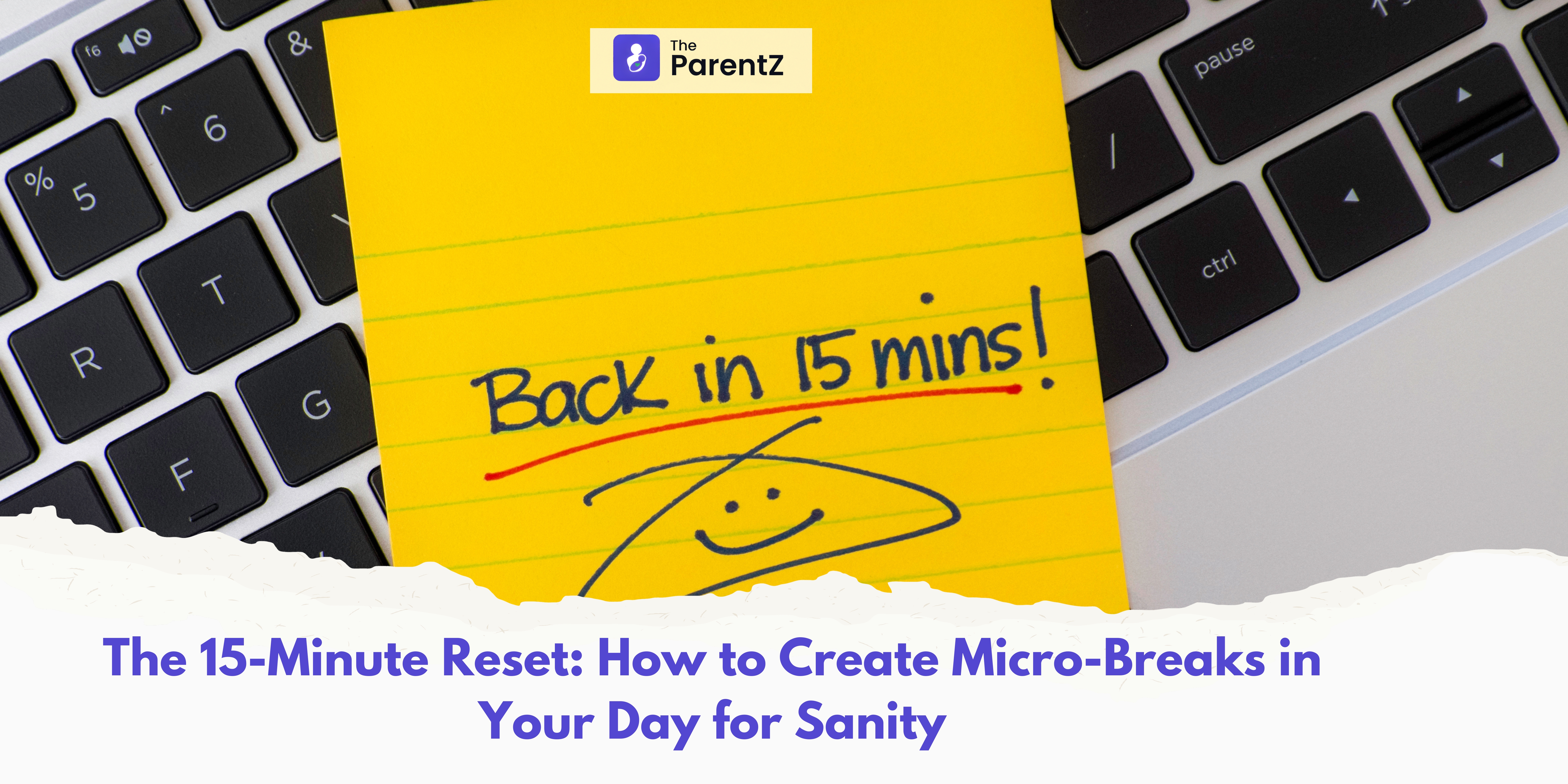In today's fast-paced world, maintaining mental well-being can often feel like a distant goal, especially for parents balancing work, family, and personal needs. Between endless tasks, tight deadlines, and the constant demands of parenting, finding time to reset and refresh might seem impossible. However, a growing body of research highlights the importance of taking short, intentional breaks — even as brief as 15 minutes — to improve both productivity and mental health. Enter the concept of the 15-minute reset, a game-changer that helps you hit pause, recharge, and regain control of your day. This article will explore how micro-breaks can benefit your mind and body, and how you can integrate them into your routine to keep burnout at bay.
What Is a 15-Minute Reset?
A 15-minute reset is exactly what it sounds like — a short break, usually around 15 minutes, that allows you to step away from your work, refocus, and return to your tasks with renewed energy. Micro-breaks like these are brief but impactful, allowing your brain to disengage from ongoing activities and recover from the constant influx of information. They can involve anything from physical movement to mental relaxation exercises, but the key is that they offer a mental and emotional reset.
Numerous studies suggest that taking regular short breaks boosts productivity, improves decision-making, and enhances creativity. These breaks are essential because they help prevent the kind of mental fatigue that leads to poor work performance and decreased concentration. More importantly, they also contribute to improved mood and overall well-being, making them invaluable for parents who juggle multiple responsibilities daily.
Why Micro-Breaks Matter
Many people believe that working longer and harder is the only way to meet all their demands. However, research points to the opposite. Our brains are not designed for long periods of uninterrupted focus. Without proper breaks, cognitive function begins to deteriorate, resulting in decreased efficiency, creativity, and even mood.
Mental Health Benefits: Micro-breaks provide the perfect opportunity to decompress, especially in stressful environments. By stepping away for 15 minutes, you’re allowing your brain to reset and reduce stress hormones like cortisol, which helps restore calm and balance. This small pause also fosters mindfulness, which can reduce anxiety and improve emotional regulation.
Physical Health Benefits: Sitting for long periods can lead to back pain, stiff muscles, and even long-term health risks like cardiovascular disease. Micro-breaks encourage movement, even if it's just a quick stretch or walk around the room. These breaks improve circulation, posture, and muscle tone, preventing many of the issues caused by a sedentary lifestyle.
Productivity Boost: Contrary to the belief that breaks hinder progress, they actually enhance productivity. A short reset prevents burnout, restores focus, and makes complex tasks feel more manageable. The Pomodoro Technique, which involves working in short, intense bursts followed by a quick break, is a perfect example of how resetting your mind every 25-30 minutes can boost productivity.
Types of Micro-Breaks:
Now that we understand why micro-breaks matter, let’s explore a few types that you can easily incorporate into your day.
1. Physical Resets: Physical activity is one of the most effective ways to rejuvenate the body and mind. Whether it's a quick stretch, a brisk walk, or even 5 minutes of yoga, engaging in physical activity during a break can reduce tension and increase energy levels. For parents, even a dance session with your children can serve as a fun, stress-relieving activity.
2. Mental Resets: Mental resets are crucial, particularly if you’ve been focusing intensely on problem-solving or creative tasks. Mental resets can include short mindfulness exercises, breathing techniques, or meditation. Apps like Headspace or Calm offer quick meditations designed for busy schedules, helping you refocus without losing too much time.
3. Emotional Resets: Taking a few moments to connect emotionally can offer a powerful reset. Call or message a loved one, engage in a positive conversation, or simply take a few minutes to practice gratitude. Emotional resets boost your mood and help you regain a positive mindset for the tasks ahead.
4. Creative Resets: Engaging the creative side of your brain for a few minutes can significantly enhance focus and innovation. Activities like doodling, journaling, or even reading something outside of your work can help you feel more refreshed and inspired when you return to your tasks.
How to Implement a 15-Minute Reset in Your Day:
Implementing a 15-minute reset in your day may feel challenging at first, especially if your schedule is packed. But the key is to prioritize your well-being by making these small pauses a non-negotiable part of your routine.
1. Schedule Your Breaks: One of the most effective ways to ensure you take your micro-breaks is by scheduling them. Setting alarms or reminders to step away from your tasks can help create a habit of taking breaks. Apps like Focus Booster or Time Out allow you to schedule your work in manageable blocks, reminding you when it’s time for a break.
2. Create a Break-Friendly Environment: Your environment plays a critical role in how effective your breaks are. Ideally, you want a space that allows you to fully disengage from work during your 15-minute reset. This could be as simple as a cozy corner where you can stretch, breathe, or read. The goal is to create a mental and physical separation from your tasks, even for a brief period.
3. Make It Part of Your Routine: Consistency is key when it comes to building new habits. Aim to take a 15-minute reset every couple of hours throughout your day, whether you're at home or at work. The more you integrate it into your routine, the more natural it will feel.
Micro-Breaks for Parents
Parents often feel as though they can't afford to take time for themselves amidst the chaos of family life. However, micro-breaks are even more critical for parents juggling both personal and professional demands. The good news is that these breaks can often be taken while your children are occupied.
1. During Nap Time or Playtime: When your children are napping or engaged in independent play, use that window for your reset. Even if it’s only 5 minutes, use that time to do something that recharges your energy.
2. Make Breaks Family-Friendly: Include your kids in your breaks. A quick family yoga session, playing outside, or even singing and dancing together can be a refreshing way to spend time together while resetting your mind.
Conclusion
Incorporating 15-minute resets into your day is a powerful, practical way to safeguard your mental well-being and maintain productivity, especially when life feels overwhelming. These micro-breaks offer the much-needed opportunity to recharge, stay focused, and reduce stress. With a little planning and a commitment to self-care, you can make the 15-minute reset an essential part of your routine — not only for your benefit but for your family’s well-being too.








Be the first one to comment on this story.